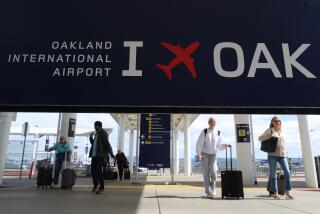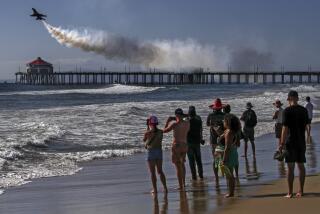Flying Club Fights for Turf
Ray’s Flying Club is the kind of place where you can sit in a hangar and enjoy the taste of soda and the smell of airplane fuel.
Every month, the nonprofit club hosts a barbecue featuring sizzling hamburgers and aviation-related speakers. Each year, at least a hundred underprivileged kids experience their first flights here. And for tight-budgeted pilots throughout Southern California, this little corner of Fullerton Municipal Airport provides the very stuff of existence: low-cost plane rentals, tie-downs and flying lessons.
“It’s a friendly outfit,” said Ed Kraly, a local pilot who keeps his Cessna 172 at Ray’s. “You can go over there any time and talk.”
But all that could soon be a thing of the past.
After years of acrimony, the city, which owns and operates the airport, is trying to evict its funky tenant. The people at the club, who earlier this month filed a complaint with the Federal Aviation Administration alleging economic discrimination, say they’ll fight hard to stay.
“We don’t have any place to go,” Mark Jensen, the organization’s vice president, said. “If we don’t prevail in this, we’re out of business.”
A hearing is set for May 3 in Orange County Superior Court.
Just what is at the heart of the fight depends on who’s talking. City and airport officials say the club is violating safety rules by encroaching on runway space with improperly parked airplanes, occupying land that is contaminated by old fuel leaks and refusing to sign a new lease.
Club officials, on the other hand, contend that all those issues are bogus.
The reality, they say, is that airport manager Rod Propst has a personal vendetta against the club fueled, in part, by the fact that its tie-down rates -- the fees charged pilots to park their airplanes -- are lower than the city’s.
“He just doesn’t like the competition,” said Tom Polley, the club’s general manager.
Counters Propst, who denies any personal motivation or concerns regarding price: “It’s a landlord-tenant dispute. They were evicted, essentially, for not entering into a lease agreement and for safety violations they refused to correct.”
The bad blood goes back at least to 1998 -- five years after Polley started Ray’s -- when, he said, Propst questioned the organization’s veracity in calling itself a “club.” The issue was eventually resolved when Ray’s began charging its members $100 in annual dues.
The next year, according to Polley, the group moved into the 2,500-square-foot World War II-era hangar previously occupied by an aircraft maintenance company that had gone out of business. And the year after that, he said, the club won its first three-year lease despite Propst’s opposition and only after filing with the FAA.
“Propst opposes the existence of Ray’s at the airport,” concludes the new complaint sent to the FAA on April 9 following the city’s eviction notice filed in September. “This eviction is an unreasonable and unjustifiable proceeding resulting in economic discrimination.”
One group likely to feel an economic pinch should the city prevail is the more than 35 amateur pilots now paying $74 a month to keep their airplanes at Ray’s; the city charges $84.
“I’m retired,” Kraly said, “and this is my only toy. When it gets too expensive, I’m going to get rid of it -- that extra $10 means a lot.”
The club, which offers inexpensive flying lessons, also rents its seven-airplane fleet for $50 to $70 an hour -- about 30% less than some of the competition at Fullerton airport.
And even Propst admits that the organization’s 120 active members could have a hard time filling its niche. “Ray’s clearly appeals to folks looking for an organization that supplies a certain amount of camaraderie,” he said. “They provide a clubhouse-type environment.”
These days, despite the cloud that hangs over that clubhouse at the edge of the runway, pilots still stop by to soak up the atmosphere and talk about airplanes. On a recent weekend, the club hosted one of its many Young Eagles Rallies, giving dozens of teenagers an airplane ride. And on the calendar for this Saturday is another barbecue featuring hot dogs.
But everyone is aware that it could be the last.
“That would be disastrous,” Polley said. “I’ve worked very hard trying to build up a community service. Without us, a lot of people couldn’t fly.”
More to Read
Sign up for Essential California
The most important California stories and recommendations in your inbox every morning.
You may occasionally receive promotional content from the Los Angeles Times.









